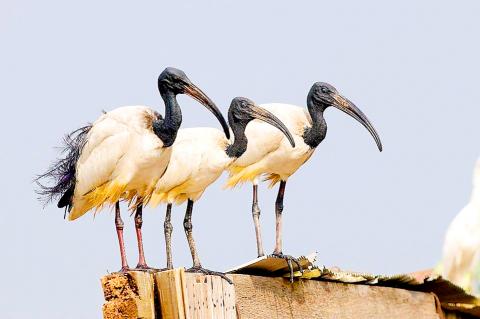The number of nests built by the invasive African sacred ibis in Changhua’s Hanbao Wetlands (漢寶濕地) has nearly tripled over the past two years, despite efforts to eradicate them, an environmentalist said.
Aerial photographs showed 800 nests in the wetlands, up from 300 two years ago, Taiwan Environmental Protection Union Changhua Division director-general Tsai Chia-yang (蔡嘉陽) said.
“The government needs a strong plan of action to deal with this,” Tsai said.

Photo courtesy of the Chinese Wild Bird Federation
The bird symbolizes wisdom in Egyptian culture, but in Europe it has been labeled as one of the 100 worst invasive animal species.
The ibis entered the wild in Taiwan 34 years ago after an enclosure at a zoo in northern Taiwan broke open in a typhoon.
The Chinese Wild Bird Federation estimates that there are 2,500 to 3,000 of the birds in the wild, making it one of the most invasive animal species in the nation.
The birds move to different areas of Taiwan proper depending on the season, Tsai said, adding that they lay about three eggs every summer and spring.
The Hanbao Wetlands are particularly suitable for nesting, since the surrounding fish farms and fields provide an abundant source of food, he said.
Rubbing corn oil on the eggs to reduce the likelihood of hatching — a common technique for dealing with invasive birds — has proven ineffective, union vice secretary Lee I-hsin (李益鑫) said.
Removing young hatchlings from treetops has also been ineffective, as the birds are easily frightened and fly away, he said, adding that officials last year succeeded in removing only about 50 of the birds.
The US government last year began allowing US residents to hunt the species using bows, but this approach would likely not work in Taiwan, he said, adding that the use of firecrackers is also being considered.
The ibis has no natural predators in Taiwan and even though environmentalists have yet to find any evidence of it harming the local ecology, it does damage vegetation when building its nest, Lee said.
The bird also shares its habitat with local herons, meaning that it might eventually crowd them out, he added.

An essay competition jointly organized by a local writing society and a publisher affiliated with the Chinese Communist Party (CCP) might have contravened the Act Governing Relations Between the People of the Taiwan Area and the Mainland Area (臺灣地區與大陸地區人民關係條例), the Mainland Affairs Council (MAC) said on Thursday. “In this case, the partner organization is clearly an agency under the CCP’s Fujian Provincial Committee,” MAC Deputy Minister and spokesperson Liang Wen-chieh (梁文傑) said at a news briefing in Taipei. “It also involves bringing Taiwanese students to China with all-expenses-paid arrangements to attend award ceremonies and camps,” Liang said. Those two “characteristics” are typically sufficient

A magnitude 5.9 earthquake that struck about 33km off the coast of Hualien City was the "main shock" in a series of quakes in the area, with aftershocks expected over the next three days, the Central Weather Administration (CWA) said yesterday. Prior to the magnitude 5.9 quake shaking most of Taiwan at 6:53pm yesterday, six other earthquakes stronger than a magnitude of 4, starting with a magnitude 5.5 quake at 6:09pm, occurred in the area. CWA Seismological Center Director Wu Chien-fu (吳健富) confirmed that the quakes were all part of the same series and that the magnitude 5.5 temblor was

The brilliant blue waters, thick foliage and bucolic atmosphere on this seemingly idyllic archipelago deep in the Pacific Ocean belie the key role it now plays in a titanic geopolitical struggle. Palau is again on the front line as China, and the US and its allies prepare their forces in an intensifying contest for control over the Asia-Pacific region. The democratic nation of just 17,000 people hosts US-controlled airstrips and soon-to-be-completed radar installations that the US military describes as “critical” to monitoring vast swathes of water and airspace. It is also a key piece of the second island chain, a string of

The Central Weather Administration has issued a heat alert for southeastern Taiwan, warning of temperatures as high as 36°C today, while alerting some coastal areas of strong winds later in the day. Kaohsiung’s Neimen District (內門) and Pingtung County’s Neipu Township (內埔) are under an orange heat alert, which warns of temperatures as high as 36°C for three consecutive days, the CWA said, citing southwest winds. The heat would also extend to Tainan’s Nansi (楠西) and Yujing (玉井) districts, as well as Pingtung’s Gaoshu (高樹), Yanpu (鹽埔) and Majia (瑪家) townships, it said, forecasting highs of up to 36°C in those areas